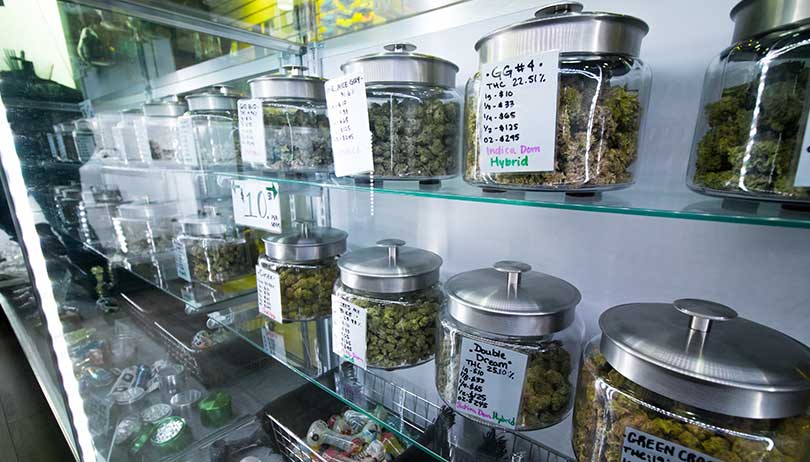For many, the War on Drugs and zero-tolerance marijuana policies are a recent memory. And yet, since California first legalized medical marijuana in 1996, cannabis has seen a remarkable evolution in both legal status and public opinion.
Where Things Stand On The Federal Level
In 2022, the full legalization of cannabis (both medical and recreational) enjoys widespread public support, with a majority of Americans (including Democrats, Independents, and Republicans) falling firmly on the side of decriminalization.
And, already more than a third of Americans live in areas where some use of marijuana has been permitted by their state government.
Schedule I Controlled Substance
Nevertheless, cannabis (including both THC and CBD products derived from cannabis) remains a schedule I controlled substance on the federal level.
This means that the Drug Enforcement Administration (DEA) and the Food and Drug Administration (FDA) technically consider it to have no medical value, and that any possession or use of cannabis can be considered a federal crime.
A crime that more than six million Americans were arrested for in the past 10 years alone.
Potential Support Of Federal Legalization
Given this tension, and the Biden administration’s professed support of legalization, it seems inevitable that Federal law will eventually be amended, opening the door to full legalization of marijuana on federal level. But when this eventually occurs, what will the actual effects be?
What Federal Legalization Would Look Like
There’s a common misconception that when federal legalization is passed, marijuana will automatically become a legal substance across the nation.
In fact, legalization would simply prompt the federal government to remove marijuana from the controlled substances schedule, allowing state legislatures to regulate marijuana sales as they see fit.
This would be similar to the current practice where state legalization is tolerated by federal authorities, assuming that states regulate the marijuana industry effectively.
This also means that legal cannabis use would continue to be limited to adults and not minors, that driving under the influence of cannabis would be a crime, and that cannabis sales and profits would be subject to federal and state tax laws.
But, as mundane as this seems, the advent of federal legalization would most likely give the cannabis industry a strong moral boost, increasing its acceptance by the public to an even greater degree and accelerating the rate of state-by-state legalization efforts.
Current Legalization Efforts
As of 2022, recreational marijuana is legal for adult use in 18 states (Alaska, Arizona, California, Colorado, Connecticut, Illinois, Maine, Massachusetts, Michigan, Montana, Nevada, New Jersey, New Mexico, New York, Oregon, Vermont, Virginia, Washington, and Washington D.C.).
Another 13 states and the U.S. Virgin Islands have decriminalized recreational use of cannabis, while medical use is currently legal with a doctor’s recommendation in 37 states and Washington D.C.
In congress, recent legalization bills have included:
- the Marijuana Opportunity Reinvestment and Expungement (MORE) Act, first passed by the U.S. House of Representatives in December of 2020 and more recently again in April of 2022, with an emphasis on legalization and expungement of criminal records
- the Safe and Fair Enforcement (SAFE) Banking Act, which has been passed by the House six times since it was first introduced in 2013 and emphasizes opening up the financial system to cannabis businesses
- the States Reform Act, which is an alternative to the MORE act and has yet to be voted on in the house
- the Cannabis Administration and Opportunity Act, sponsored by Senate Majority Leader Chuck Schumer, which focuses on legalization, recognition of state laws, banking reform, criminal justice reform, expungement, and funding of public health and community reinvestment, which is expected to be voted on by the Senate in 2022
Potential Benefits Of Federal Marijuana Legalization
Proponents of Federal legalization are quick to point out a wide variety of beneficial effects that it might bring, including:
- job growth and economic expansion
- improved regulation of cannabis products, benefiting consumer safety
- increased research into the medical applications of cannabis
- expanded tax revenue
- reduced legal jeopardy for millions of Americans, particularly those of color who make up 2/3rds of all those arrested or imprisoned for marijuana possession
- expungement for millions of Americans with non-violent drug offenses on their records
- redirected law enforcement resources, especially towards combating lethal substances like fentanyl or designer drugs
- improved safety for dispensaries and other cannabis businesses, which would be able to cross state lines and access credit card processing services
- potential standardization of state marijuana laws
Potential Risks & Cautions Of Federal Cannabis Legalization
While numerous activists and many lawmakers are actively pursuing legalization, some experts urge caution while others actively discourage federal legalization for some surprising reasons:
- federal legalization could prompt larger companies, like Amazon or big tobacco companies, to surge into state markets and wipe out the small businesses that have flourished under cannabis-friendly state laws
- legalization could trigger a wave of federal policy-making that might cause “regulatory chaos” in the states, putting entire sections of state marijuana industries under strain or out of business
There is also a perceived risk of worsening cannabis use disorder or mariujana addiction. Research suggests that one-in-ten adults who use marijuana develop addiction, and with increasing potency and availability, we could see higher rates of dependence and addiction.
If you or a loved one live with marijuana addiction and need help, please contact us today.
Keep Reading:
Sources:
Drug Policy Alliance — Marijuana Legalization and Regulation
Library of Congress — H.R.1996 – 117th Congress (2021-2022): SAFE Banking Act of 2021
Library of Congress — H.R.3617 – 117th Congress (2021-2022): Marijuana Opportunity Reinvestment and Expungement Act
Senate Democrats — CAOA Detailed Summary
Substance Abuse and Mental Health Services Administration (SAMHSA) — Know the Risks of Marijuana
Vox — Federal marijuana legalization is stopped in its tracks


